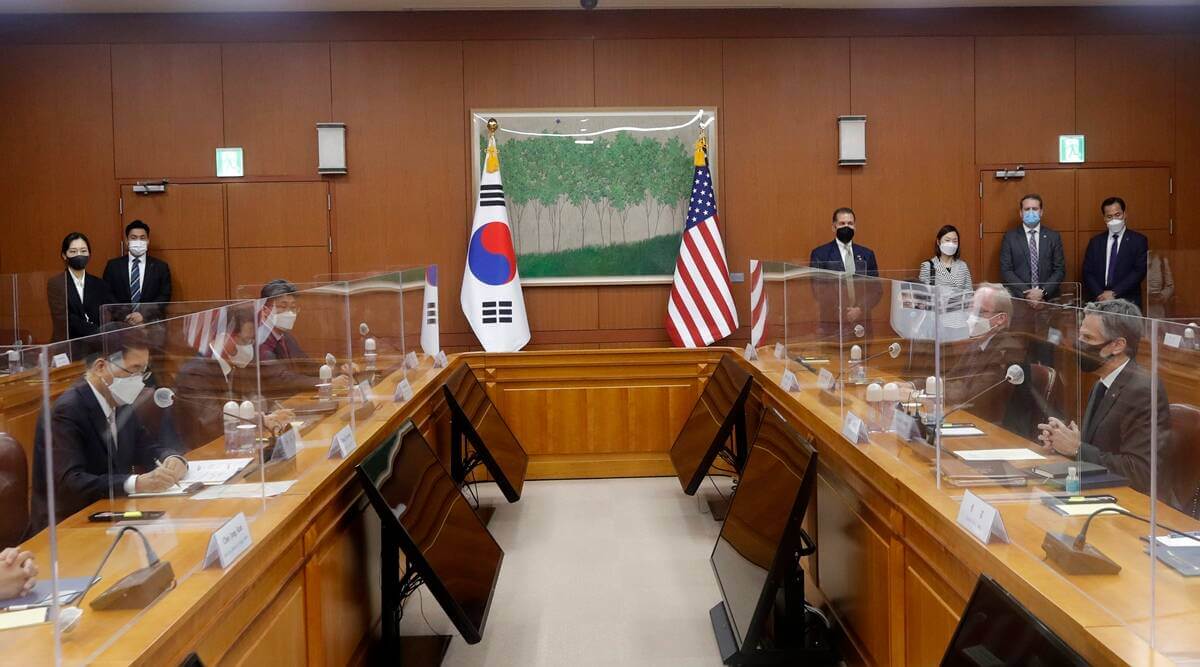Following their trip to Tokyo, US Secretary of State Antony Blinken and Secretary of Defence Lloyd Austin met with their South Korean counterparts in Seoul on Wednesday, where they reaffirmed the importance of the US-Republic of Korea (ROK) relationship as a strong counterweight to the trials posed by an increasingly assertive China and a nuclear-armed North Korea (DPRK), and as one that promotes “promotes peace, security, and prosperity in the Indo-Pacific and around the world.”
Secretary Austin spoke with South Korean defence minister Suh Wook at the Defence Ministry in the afternoon and discussed ways to ensure combat readiness and maintain a robust defence posture in the face of “unprecedented challenges” presented by Beijing and Pyongyang. The pair also reiterated their commitment to supporting diplomatic efforts to achieve the denuclearisation of North Korea under the auspices of United Nations Security Council Resolutions (UNSCR). Moreover, the leaders vowed to continue efforts towards the transfer of wartime operational control of South Korean troops from Washington to Seoul, enhance regional cooperation to protect the rules-based international order, and work towards rejuvenating trilateral cooperation with Japan.
Secretary Blinken and South Korean Foreign Minister Chung Eui-yong held talks at the Foreign Ministry later in the day. The officials discussed a wide range of issues—including bilateral relations, the situation on the Korean peninsula, and regional and global affairs—and exchanged views on how to continue to better develop US-ROK relations in a mutually beneficial way. Both sides agreed that the North Korea issue was an urgent matter than needed to be addressed as quickly as possible, and the ministers acknowledged that “that devising and implementing a fully-coordinated strategy toward policy” on Pyongyang was vital, which required close coordination and cooperation at various levels, including during the process of US policy review on the DPRK.
The countries also agreed to continue close communication to hold a US-Korea summit at the earliest possible opportunity. Additionally, the leaders committed to strengthening bilateral cooperation to tackle global issues like the current coronavirus pandemic and climate change and promote shared values including democracy and respect for human rights. The leaders also condemned China’s coercive tactics in Hong Kong, Taiwan, Tibet, and the South China Sea, and expressed concern over the unfolding violence against peaceful civilians in Myanmar.
On Thursday, Blinken and Austin will meet with their counterparts together for a “two-plus-two” dialogue, wherein they will discuss the strength of their alliance to counter regional challenges. The US leaders are also expected to speak with South Korean President Moon Jae-in later in the day, as well as hold meetings with the president’s top security adviser, Suh Hoon.
US, ROK Discuss North Korea Denuclearisation & Indo-Pacific Security in Seoul Meeting
The leaders reaffirmed the importance of the US-Republic of Korea (ROK) as a strong counterweight to the trials posed by an increasingly assertive China and a nuclear-armed North Korea (DPRK).
March 18, 2021

US Secretary of State Antony Blinken (R) and South Korean Foreign Minister Chung Eui-yong (L) at the Foreign Ministry in Seoul, South Korea. SOURCE: AP PHOTO/LEE JIN-MAN, POOL via THE INDIAN EXPRESS
